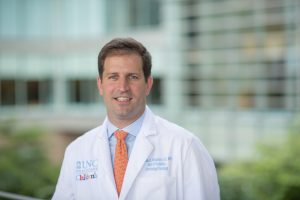
The St. Baldrick’s Foundation has awarded a research grant to University of North Carolina Lineberger Comprehensive Cancer Center physician-scientist Thomas Alexander, MD, MPH, to support his research focused on the biology of acute lymphoblastic leukemia that doesn’t fully respond to treatment.
The grant, for $94,800, is from the latest round of grants from the St. Baldrick’s Foundation, the largest private funder of childhood cancer research grants. The foundation awarded more than $17.5 million this year to support physician-scientists studying innovative treatment options for pediatric cancer.
While overall survival for children with acute lymphoblastic leukemia approaches 90 percent, children who continue to have evidence of cancer after the first month of therapy – called minimal residual disease – have worse outcomes. Adults with acute lymphoblastic leukemia have a five-year survival rate of 30 to 40 percent, and rates of relapse is higher for patients in high-risk subgroups, including adults who have residual disease after the first month of therapy.
“There’s been an explosion in being able to detect very low levels of disease – or what’s called minimal residual disease — by a variety of techniques, and that has allowed us to make incredible strides by risk stratifying patients and adjusting the intensity of therapy. But it remains clear that if you have detectable MRD, your prognosis is much worse,” said Alexander, who is UNC Lineberger member and assistant professor in the UNC School of Medicine Department of Pediatrics. “We want to directly study the biology of minimal residual disease in these patients because they are higher risk and need better therapies.”
The new research grant will support a study to better understand the unique biology of minimal residual disease by collecting samples from patients and analyzing their biological characteristics.
“We want to learn the dynamics of leukemia as it’s going away,” Alexander said. “These are the last cells to die; why are they still around when 99 percent of the other malignant cells are gone?”
To analyze the remaining cells, Alexander is collaborating with UNC Lineberger epigenetics experts. That’s because researchers believe the unique biology of these cells is driven by epigenetic differences, instead of mutations in their DNA. In other words, they have differences in the way the DNA is coiled and structured, which can impact how the DNA is decoded and translated into proteins, rather than containing errors in the actual DNA code itself.
“So much work has been done to look at DNA mutations, but mutations only capture one component of the biology of the cells,” Alexander said. “We are learning more and more that the epigenetic state and associated protein translation can drive the difference in biology, independent of DNA mutations.”
The project will require researchers to demonstrate that it is feasible to collect rare cell populations, and analyze these samples by their epigenetic characteristics as well as to develop transcriptional and epigenetic profiles for different cancers. Ultimately, they want to identify differences that can be targeted therapeutically.
“If the hypothesis is correct – that the biology is different for MRD compared with diagnostic samples – then eventually we hope to be able to target it with more effective therapies,” Alexander said.
About St. Baldrick’s Foundation
As the largest private funder of childhood cancer research grants, the St. Baldrick’s Foundation is leading the charge to take childhood back from cancer. St. Baldrick’s funds some of the most brilliant childhood cancer research experts who are working to find cures and better treatments for all childhood cancers. Kids need treatments as unique as they are – and that starts with funding research just for them. Join us at StBaldricks.org to help support the best childhood cancer research, no matter where it takes place.
